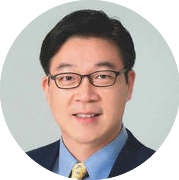Ciprian Catana, MD, PHD Director of Integrated PET/MR Imaging Athinoula…
Seung-Schik Yoo, PhD: Wearable Modular Focused Ultrasound System for Non-invasive Brain stimulation During Deep Space Exploration

Abstract
Deep space exploration will cast unprecedented, multi-faceted health challenges for astronauts. The development of a non-invasive technique that can modulate region-specific brain activity may provide non-pharmacological alternatives for neurological/ psychological interventions for crew members undergoing long space missions. To date, transcranial magnetic stimulation (TMS) and transcranial direct current stimulation (tDCS) have shown non-invasive neuromodulatory capabilities, but lack spatial specificity and depth penetration. Advancements in focused ultrasound (FUS) techniques have allowed for the non-invasive transcranial delivery of acoustic energy to cortical, as well as deep brain structures, with excellent spatial selectively. Capitalizing on this exquisite capability, device development and its application in humans to safely/transiently stimulate well-characterized regional neural circuitries, both cortical and deep brain areas, such as the somatosensory pathways in the brain, are needed prior to the long-term, repeated administration of the technique for modulating the function of neural circuities associated with the enhancement of cognitive performance or therapeutics. We introduce a modular, low-power transcranial FUS system, equipped with an image-guidance capability and on-site numerical simulation of the acoustic propagation, aiming for its routine use during deep space exploration. The FUS transducer will be made wearable using a light-weight headgear configuration and will be used to accurately sonicate user-defined specific areas in both cortical and subcortical deep brain regions. Preliminary design of the system and its features will be discussed as well as demonstration of FUS-mediated regional neuromodulation of the brain in various animal models.
Short Bio
Seung-Schik is an associate professor of Radiology, Harvard Medical School, also a director of Neuromodulation and Tissue Engineering Laboratory (NTEL) at Brigham and Women’s Hospital. He serves as a faculty member of Mind Brain Behavior at Harvard University. After majoring in Biomedical Engineering at Johns Hopkins University, he moved to Boston to finish his graduate work at Harvard-MIT Health Sciences and Technology (HST), and developed real-time functional MRI methods for neuroscientific research. His current research interests include advancing the technique for non-invasive brain stimulation achievable through focused ultrasound, brain-to-brain interface, and brain-to-computer interface applications in various neurotherapeutics. He is also developing three-dimensional bioprinting technology that can ‘print out’ artificial biological tissues and organoids for potential applications in cancer research and regenerative medicine, and serves as a committee chair for the Boston Bioprinting Consortium.